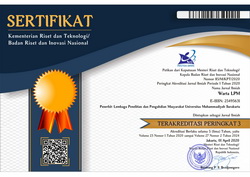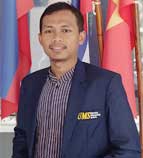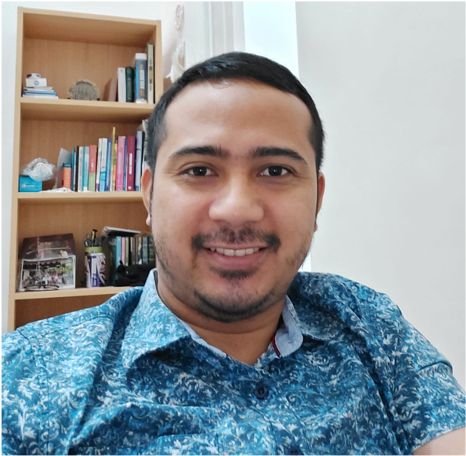Asset Based Village Development, A Good Practice from Desa Banyuurip Ujungpangkah, Kabupaten Gresik in Maintenance Mangrove Area as Touris Destination
DOI:
https://doi.org/10.23917/warta.v25i1.603Keywords:
Community Based Tourism, Participatory Development, SWOTAbstract
This study analyses the effort of the Banyuurip village in enhancing their potencies and asset in preserving mangrove area. The purpose of this writing to portray the involvement of the youth in sustains local tourism development. The parameters used to determine the degree of public participation in the development planning phase are the involvement in problem identification, objective formulation, and decision making related to the development of the local tourist attraction. This paper analysed the five strategies of Banyuurip village government and their counterpart in creating sustainable tourism system. The SWOT analyses employ to analyse the five elements of strategies in creating sustainable tourism system. This approach is believed able to provide an holistic analysis in Community Based Tourism (CBT) development. The problems faced by the Banyuurip tourism community in managing their local tourist destination are lack of adequate human resources, limited of public facilities, limited financial support, lack of regulation that support the CBT, inter-organizational coordination problems, conflict of interest among group of community, and property ownership. This writing found that the position of the village leader both formal and informal leader is significant in CBT Development. However, the sustainable tourism it self requires the government political will in the development of CBT.
References
Blaikie, P. M., & Brookfield, H. (1987). Land degradation and society London: London : Methuen.
Carpenter, S., Walker, B., Anderies, J. M., & Abel, N. (2001). From Metaphor to Measurement: Resilience of What to What? Ecosystems, 4(8), 765-781. doi:10.2307/3659056
Carr, W., & Kemmis, S. (1986). Becoming Critical : Education, Knowledge, and Action Research. London Philadelphia: London Philadelphia : Falmer Press.
Chambers, R., & Conway, G. (1992). Sustainable Rural Livelihoods: Practical Concepts For The 21st Century. IDS Discussion Paper 296. Retrieved from http://opendocs.ids.ac.uk/opendocs/bitstream/handle/123456789/775/Dp296.pdf?sequence=1
Creswell, J. W. (2009). Research Design : Qualitative, Quantitative, and Mixed Methods Approaches / John W. Creswell. Los Angeles: Los Angeles : Sage.
DFID. (1999). DFID Sustainable Livelihoods Guidance Sheets. Department for International Development Retrieved from http://www.ennonline.net/resources/667.
Fiksel, J. (2003). Designing Resilient, Sustainable Systems. Environmental Science & Technology, 37(23), 5330-5339. doi:10.1021/es0344819
Franken, R. E., & Bauers, P. (2002). Human motivation: Wadsworth/Thomson Learning.
Giesen, W., Wulffraat, S., Zieren, M., & Scholten, L. (2007). Mangrove guidebook for Southeast Asia. Mangrove guidebook for Southeast Asia.
Holling, C. S. (1973). Resilience and Stability of Ecological Systems. Annual Review of Ecology and Systematics, 4(1), 1-23. doi:doi:10.1146/annurev.es.04.110173.000245
Howlett, M., & Ramesh, M. (2003). Studying public policy: Policy Cycles and Policy Subsystems: Oxford University Press.
Koshy, V. (2005). Action Research for Improving Practice: A Practical Guide. London: London : Sage Publiations Ltd.
Ludi, E., & Slater, R. (2008). Using the Sustainable Livelihoods Framework to Understand and Tackle poverty. Retrieved from http://www.poverty-wellbeing.net/document.php?itemID=2396&langID=1.
McNiff, J. (2010). You and your Action Research Project/Jean McNiff and Jack Whitehead. New York: London
Ott, W. (2014). Access to Drinking Water and Stakeholder Action-Drinking Water Governance in Cameroon from a Political-Ecological Perspective Case Study: Upper Mefou Watershed, Cameroon. Freie Universität Berlin.
Pedretti, E., & Hodson, D. (1995). From Rhetoric to Action: Implementing STS Education Through Action Research. Journal of Research in Science Teaching, 32(5), 463-485. doi:10.1002/tea.3660320505
Peet, R., & Watts, M. (2004). Liberation Ecologies : Environment, Development, Social Movements/Edited by Richard Peet and Michael Watts (2nd ed.. ed.). London New York: Routledge.
Pettit, T. J., Fiksel, J., & Croxton, K. L. (2010). Ensuring Supply Chain Resilience: Development of a Conceptual Framework. Journal of Business Logistics, 31(1), 1-21. doi:10.1002/j.2158-1592.2010.tb00125.x
Ponomarov, S. (2012). Antecedents and Consequences of Supply Chain Resilience: A Dynamic Capabilities Perspective. (Doctor of Philosophy), University of Tennessee. Retrieved from http://trace.tennessee.edu/cgi/viewcontent.cgi?article=2526&context=utk_graddiss (1338)
Powell, W. W., & Snellman, K. (2004). The knowledge Economy. Annual Review of Sociology, 30, 199.
Remoundou, K., Koundouri, P., Kontogianni, A., Nunes, P. A., & Skourtos, M. (2009). Valuation of Natural Marine Ecosystems: an economic perspective. Environmental science & policy, 12(7), 1040-1051.
Scoones, I. (1998). Sustainable Rural Livelihoods: A Framework for Analysis Vol. IDS Working Paper 72. Retrieved from http://www.ids.ac.uk/files/dmfile/Wp72.pdf
Suparmoko, M. (2006). Panduan dan Analisis Valuasi Ekonomi Sumberdaya Alam dan Lingkungan (Konsep, Metode Perhitungan dan Aplikasi) [Guide and Economic Valuation Analysis of Natural Resources and Environment (Concepts, Calculation Methods and Applications)] (1 ed.). Yogyakarta: Penerbit BPFE-Yogyakarta.
Vatria, B. (2013). Berbagai Kegiatan Manusia yang Dapat Menyebabkan Terjadinya Degradasi Ekosistem Pantai Serta Dampak yang Ditimbulkannya [Various human activities that can lead to degradation of the coastal ecosystem and its impacts]. e-Journal Belian, PJ-Belian-9-1-Januari-2010.
Downloads
Submitted
Published
How to Cite
Issue
Section
License
Copyright (c) 2022 Warta LPM

This work is licensed under a Creative Commons Attribution 4.0 International License.















